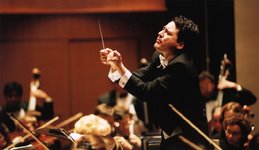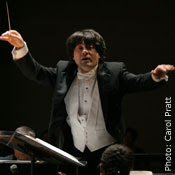
Puerto Rican flutist Josué Casillas will be performing a solo with the Alexandria Symphony Orchestra on May 22-23 that he has never heard performed before. And he likes it that way.
“It’s one of those adventures, but I’m good at that,” he said. “In the years I played in Houston, Texas, I played with a group that presented new music at recitals – music that hasn’t been recorded. That’s art in its crudest and most valuable sense. It’s like a painter creating colors from scratch. It’s a privilege to create something fresh and new and make it alive.”
Casillas, 45, will be soloing during “Atmosphere as a Fluid System,” a composition by Minneapolis composer Libby Larsen. While Larsen is a popular and prolific composer, orchestras rarely perform pieces that audiences are unfamiliar with.
“It is usually the 20th Century (and earlier) composers that they are sure are marketable, such as Tchaikovsky, Bach, Mozart,” he said. “But there is something to be said for new music. It challenges our souls and our hearts. It makes us better human beings and better servants to society. Libby Larsen is an amazing composer. (“Atmosphere as a Fluid System”) is all about fluidity and the flow of the orchestra sounds into the flow of the flute sounds. It’s very modern in that way --- we live in a dynamic, ever-changing world.”
Despite flying in just a week before the concert from Puerto Rico, where Casillas is the principal flutist of the Orquesta Sinfónica de Puerto Rico and the flute professor at the Conservatorio de Música de Puerto Rico, he said he will be prepared to play the piece with musicians and a conductor that he has never worked with before.
“Oh, it’s nerve-wracking, but thanks to tradition and discipline, we all have the same language – music,” he said. “The human spirit is the same, whether you’re from Puerto Rico, China or America – musicians are all just human. That’s how the collaboration can occur.”
Casillas said he also has pressure to perform for his sponsor, Suzanne Brock, who brought him to Alexandria after seeing him perform with The Orchestra and Community Choral Artists of the Tahoe Area in Incline Village, Nevada, over the course of four summers; and for former students – who he calls “my peoples” -- who will be flying in from all over the country to see his performance with the ASO. “I want to do a good job for them,” he said.
Casillas will also be performing with another flutist, Sara Stern, during Telemann’s “Double Flute Concerto.”
“It’s a privilege because we are not going to meet at a bus stop, or at the library or any other way people normally meet. Telemann has brought us together,” he said. “I have a college friend I met at the Cleveland Institute of Music, who is Chinese. English was her second language and English is my second language, but we had music.”
In addition to his duties rehearsing with the ASO the week of the concert, Casillas will take one day to fly to Winston-Salem to teach a master class at the University of North Carolina School of the Arts.
“Being Hispanic, we are famous for being laid-back,” he said. “I had to change my way of thinking. Orchestras are very competitive. I have to be prepared.”
-- You can read more about Josué Casillas here: http://www.miyazawa.com/index.php?option=com_content&task=view&id=1869&Itemid=3100
-- Or listen to his performances on YouTube: http://www.youtube.com/user/josueflute
GET TICKETS HERE: www.alexsym.org






